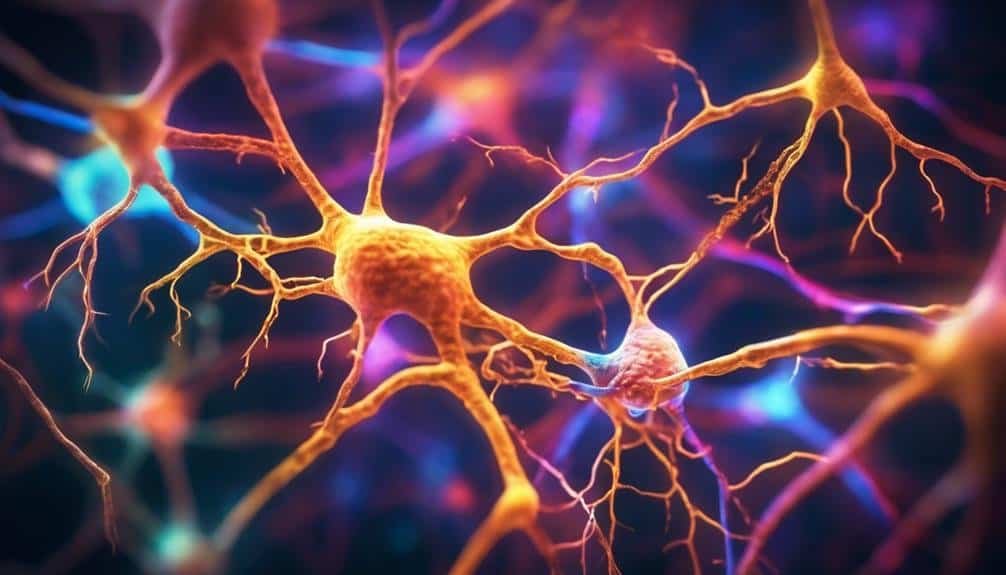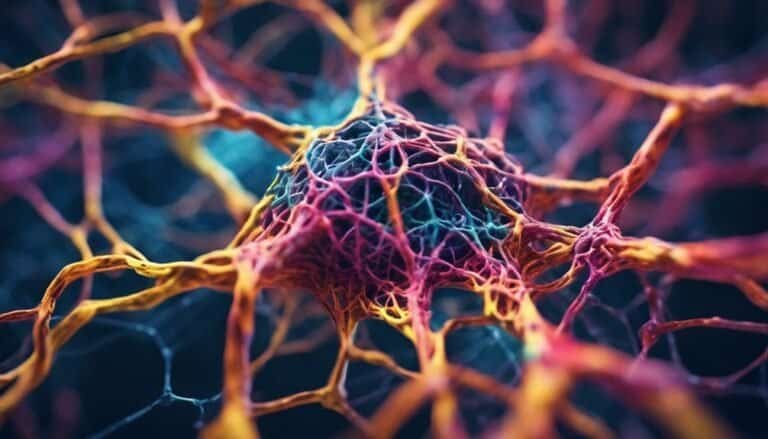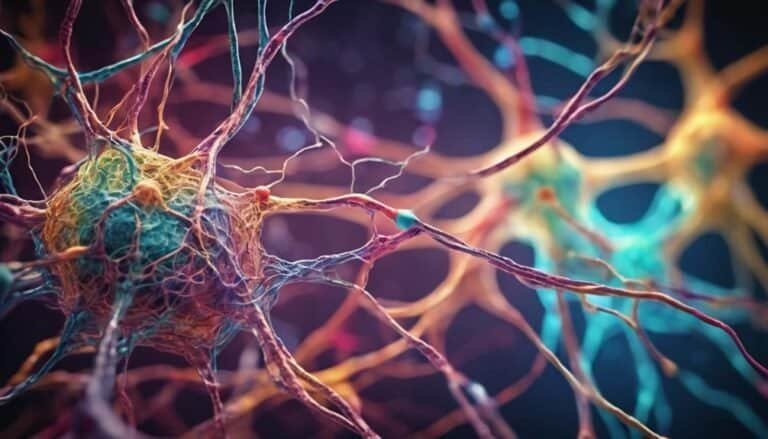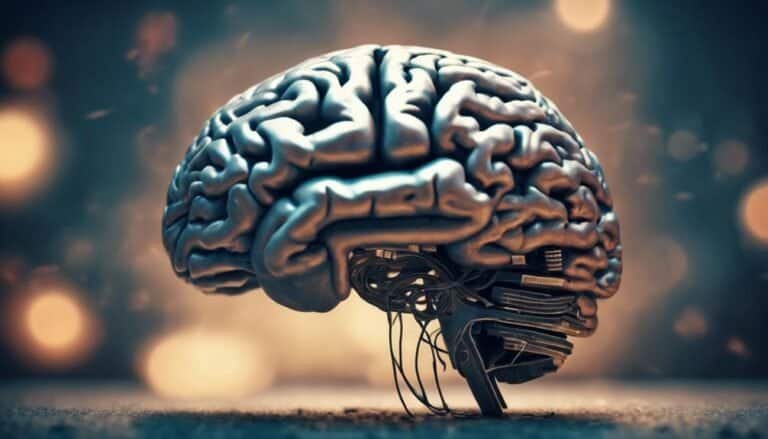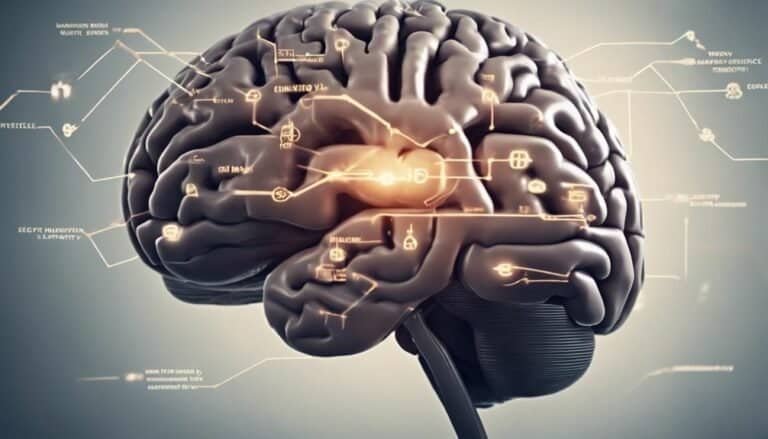Brain Insights for Enhancing Memory
Have you ever wondered how your brain holds onto memories and how you can improve this process? Understanding the intricate mechanisms behind memory formation and recall can offer valuable insights into enhancing your cognitive abilities.
By exploring the role of neurotransmitters, the impact of sleep, and cognitive strategies, you can uncover practical ways to boost your memory performance. But that's just the beginning; delve deeper into the fascinating world of brain insights for memory enhancement.
Key Takeaways
- Engage in cognitive exercises to stimulate neuroplasticity for memory enhancement.
- Optimize neurotransmitter function through mindfulness techniques and mnemonic devices.
- Ensure adequate sleep for vital memory consolidation, especially during slow-wave and REM sleep.
- Implement cognitive strategies like mindfulness, mnemonic devices, chunking, spaced repetition, and dual coding for memory improvement.
Brain Structure and Memory Formation
Understanding the intricate relationship between brain structure and memory formation is crucial in unraveling the mysteries of human cognition. Neuroplasticity, the brain's ability to reorganize itself by forming new neural connections, plays a vital role in memory retention. When new information is learned, synaptic connections between neurons are strengthened or created, leading to memory formation. These synaptic connections are essential for encoding memories and retrieving them when needed. Studies have shown that stimulating neuroplasticity through activities like learning new skills or engaging in cognitive exercises can enhance memory retention.
Furthermore, the structural changes in the brain that occur during memory formation are closely tied to the strengthening of synaptic connections. As memories are encoded, specific neural pathways are reinforced, making it easier for the brain to access and retrieve information. By understanding the mechanisms of neuroplasticity and synaptic connections in memory formation, researchers can develop strategies to improve memory retention and cognitive function.
Neurotransmitters and Memory Encoding
Neurotransmitters play a pivotal role in the process of memory encoding within the intricate network of the brain. Through neurotransmitter modulation, the brain encodes and stores information received from the environment. When you encounter new information or experiences, neurotransmitters such as dopamine and acetylcholine are released in specific regions of the brain, aiding in the encoding of memories. These neurotransmitters help strengthen the connections between neurons, facilitating the formation of new memory traces.
Understanding neurotransmitter function is crucial for implementing effective memory retention strategies. By targeting specific neurotransmitter systems, such as through pharmacological interventions or lifestyle modifications, you can enhance memory encoding processes. For instance, engaging in regular physical exercise has been shown to boost neurotransmitter activity, thereby improving memory formation. Additionally, practicing mindfulness techniques or utilizing mnemonic devices can also optimize neurotransmitter function and enhance memory encoding.
Role of Hippocampus in Memory Consolidation
The hippocampus, a key region in the brain, plays a pivotal role in the consolidation of memories. This structure is crucial for integrating new memories into the complex neural networks of the brain.
- Hippocampus Function: The hippocampus processes and encodes different types of memories, including episodic and spatial memories, before they're stored in long-term memory.
- Memory Consolidation: It's involved in the process of stabilizing memories after initial encoding, making them more resistant to interference or forgetting.
- Neural Pathways: The hippocampus communicates with various brain regions, such as the prefrontal cortex and amygdala, to facilitate memory consolidation through interconnected neural pathways.
- Memory Storage: Once memories are consolidated in the hippocampus, they're gradually transferred to other brain regions for long-term storage, allowing for efficient retrieval when needed.
- Spatial Navigation: Apart from memory, the hippocampus also plays a role in spatial navigation and cognitive mapping, contributing to our ability to navigate our surroundings and form mental representations of space.
Impact of Sleep on Memory Processing
With the consolidation of memories in the hippocampus elucidated, the impact of sleep on memory processing emerges as a critical avenue for further exploration in understanding memory mechanisms. Quality sleep plays a pivotal role in memory retention. During sleep, the brain undergoes essential processes that contribute to memory consolidation and overall cognitive function. Here is a table summarizing the key aspects of how sleep influences memory processing:
| Aspect | Description | Importance |
|---|---|---|
| Slow-wave sleep | Deep sleep stage characterized by slow brain waves; critical for memory consolidation | Vital for memory retention and learning |
| REM sleep | Rapid Eye Movement sleep stage associated with vivid dreaming; important for emotional memory processing | Facilitates emotional memory consolidation |
| Sleep cycles | Consist of alternating REM and non-REM stages; play a role in memory processing efficiency | Ensures comprehensive memory consolidation |
| Sleep deprivation | Inadequate sleep negatively impacts memory formation and retention | Highlighting the importance of quality sleep |
| Sleep hygiene | Practices that promote good sleep quality; crucial for optimal memory function | Enhances memory consolidation and cognitive skills |
Understanding the intricate relationship between sleep quality and memory retention is fundamental in enhancing cognitive abilities and memory recall. Prioritizing good sleep habits can significantly improve overall memory performance.
Cognitive Strategies for Memory Improvement
Enhancing memory through cognitive strategies requires a systematic approach that leverages proven techniques to optimize memory retention and recall efficiency. When aiming to enhance memory, incorporating mindful practices and cognitive training is essential. By utilizing specific retention techniques, you can significantly improve memory recall.
Here are five key strategies to boost your memory:
- Practice Mindfulness: Engage in mindfulness activities to improve focus and reduce cognitive overload.
- Utilize Mnemonic Devices: Employ mnemonic techniques like acronyms or visualization to aid memory retention.
- Chunking Information: Break down complex information into smaller, manageable chunks for easier recollection.
- Spaced Repetition: Review material at spaced intervals to reinforce memory and enhance long-term retention.
- Dual Coding: Combine verbal and visual information to create multiple memory pathways for better recall efficiency.
Emotions and Memory Retrieval
When you experience strong emotions, such as fear or joy, the brain releases neurotransmitters that can enhance memory formation.
These emotional memories are often more vivid and easily recalled due to the amygdala's involvement in encoding emotional experiences.
Understanding how emotions influence memory retrieval can offer insights into improving memory recall and the impact of emotional states on cognitive processes.
Emotional Impact on Memory
Emotions play a significant role in memory retrieval processes, influencing the encoding, storage, and recall of information in the brain. When exploring the emotional impact on memory, it's crucial to consider various factors that can affect this intricate relationship:
- Emotional intensity can enhance memory consolidation.
- Positive emotions tend to improve memory retrieval.
- Negative emotions may lead to stronger memory formation.
- Emotional arousal can prioritize certain memories for retrieval.
- Emotional regulation techniques can help manage stress and enhance memory performance.
Understanding how emotions interact with memory processes can provide valuable insights into optimizing memory function and developing effective memory enhancement strategies.
Memory Recall and Emotions
Considering the intricate relationship between emotions and memory processes, the role of emotional states in memory recall is a critical aspect to explore.
Emotional triggers play a significant role in memory retrieval, as they can serve as powerful cues that enhance the recall of specific events or information.
When an individual experiences strong emotions, such as joy, fear, or sadness, during an event, these emotions become linked to the memory of that event.
These memory associations are formed in the brain, creating a network of interconnected neural pathways that can be activated when similar emotional states are experienced in the future.
Understanding how emotions influence memory recall can provide valuable insights into optimizing memory performance and enhancing overall cognitive functioning.
Lifestyle Factors Affecting Memory Performance
Understanding how lifestyle factors impact memory performance is crucial for optimizing cognitive function. Various lifestyle choices can significantly influence memory retention and recall.
Here are five key lifestyle factors that play a significant role in affecting memory performance:
- Dietary Habits: Consuming a diet rich in antioxidants, omega-3 fatty acids, and vitamins can enhance memory function.
- Exercise Routines: Engaging in regular physical activity improves blood flow to the brain, promoting better memory formation and retrieval.
- Sleep Patterns: Adequate sleep is essential for memory consolidation processes that occur during the night.
- Stress Management: High levels of stress can impair memory, so practicing stress-reducing techniques is beneficial.
- Social Interactions: Maintaining social connections and engaging in meaningful conversations can stimulate brain activity and support memory function.
Conclusion
You may think you have control over your memory, but in reality, your brain holds the power. By understanding the intricate workings of your brain, neurotransmitters, hippocampus, sleep patterns, cognitive strategies, emotions, and lifestyle choices, you can enhance your memory capabilities.
So next time you forget where you left your keys, remember that it's not just about forgetfulness, it's about mastering the art of memory through brain insights.

